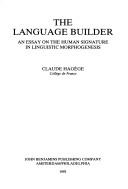| Listing 1 - 2 of 2 |
Sort by
|

ISBN: 9027235945 1556191553 9786613312990 1283312999 9027277001 9789027277008 9781283312998 6613312991 9789027235947 9027235961 9789027235961 9781556191558 155619157X 9781556191572 Year: 1993 Publisher: Amsterdam ; Philadelphia : John Benjamins Pub. Co.,
Abstract | Keywords | Export | Availability | Bookmark
 Loading...
Loading...Choose an application
- Reference Manager
- EndNote
- RefWorks (Direct export to RefWorks)
Linguistics, as a social science, should have something to teach us about humans as social beings. However, modern grammatical theories regard languages as autonomous systems, so these theories are little concerned with speakers and hearers, their interactions, and their relationship to the world around them. Further, these theories tend toward excessive concern with methodology and the properties of linguistic systems, neglecting, in fact, the languages themselves and those who use them in everyday life. Even the shift toward cognitive approaches, promising for their new insights into the bra
Linguistics --- Language and languages --- Linguistics. --- Language and languages. --- Foreign languages --- Languages --- Anthropology --- Communication --- Ethnology --- Information theory --- Meaning (Psychology) --- Philology --- Linguistic science --- Science of language
Book
ISBN: 1282353160 9786612353161 0300155794 9780300155792 9780300137330 0300137338 9780300167870 0300167873 9781282353169 6612353163 Year: 2009 Publisher: New Haven : Yale University Press,
Abstract | Keywords | Export | Availability | Bookmark
 Loading...
Loading...Choose an application
- Reference Manager
- EndNote
- RefWorks (Direct export to RefWorks)
Twenty-five languages die each year; at this pace, half the world’s five thousand languages will disappear within the next century. In this timely book, Claude Hagège seeks to make clear the magnitude of the cultural loss represented by the crisis of language death.By focusing on the relationship of language to culture and the world of ideas, Hagège shows how languages are themselves crucial repositories of culture; the traditions, proverbs, and knowledge of our ancestors reside in the language we use. His wide-ranging examination covers all continents and language families to uncover not only how languages die, but also how they can be revitalized—for example in the remarkable case of Hebrew. In a striking metaphor, Hagège likens languages to bonfires of social behavior that leave behind sparks even after they die; from these sparks languages can be rekindled and made to live again.
Language obsolescence. --- Language revival. --- Language and languages --- Language renewal --- Language revitalization --- Renewal, Language --- Restoration of languages --- Revitalization, Language --- Revival of languages --- Sociolinguistics --- Language death --- Obsolescence of languages --- Historical linguistics --- Endangered languages --- Extinct languages --- Restoration --- Revival --- Obsolescence
| Listing 1 - 2 of 2 |
Sort by
|

 Search
Search Feedback
Feedback About UniCat
About UniCat  Help
Help News
News